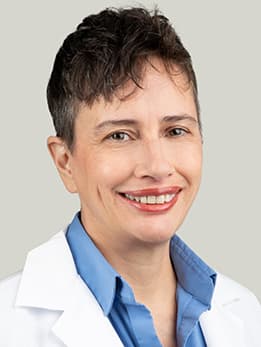UChicago Medicine offering novel prevention option to women at risk for ovarian cancer

Could delaying removal of ovaries prevent or delay sexual dysfunction in women who are at high risk for developing ovarian cancer? University of Chicago Medicine researcher Iris Romero, MD, MS, launched a study with researchers at other leading institutions to answer this question.
When women carry certain gene mutations like BRCA1, their chances of developing certain cancers, such as ovarian and breast cancer, increase by as much as 39 percent. Since current screening options for ovarian cancer don't reliably catch the disease at a treatable stage, most high-risk patients are encouraged to undergo one surgery removing both their fallopian tubes and ovaries.
"This group of patients can't rely on screening as a way to manage their cancer risk," said Romero, associate professor of obstetrics/gynecology. "The goal of our study is to evaluate menopausal symptoms and sexual function in patients who choose either the traditional approach or approach of taking out only the fallopian tubes at the first surgery and then closer to the time of menopause doing a second surgery to remove the ovaries."
Romero is UChicago Medicine's primary investigator for the study, which is known as the WISP trial, or Women Choosing Surgical Prevention. Recent preclinical research data suggests ovarian cancer may begin in the fallopian tubes-which could mean removing the fallopian tubes may protect against ovarian cancer.
By May 2017, 48 women had enrolled in the trial nationally. Twenty-one of those patients opted to have separate surgeries, while 27 chose the traditional approach of having both their tubes and ovaries removed during the same session (surgeries known as salpingectomy and oophorectomy, respectively). Removing the ovaries can speed up the process of menopause, so some of the women may experience earlier onset of hot flashes and other issues. After surgery, patients are surveyed about overall changes in sexual function.
"A novel part of this is that we use online portals to survey patients, as opposed to more historic research methods like mailers," Romero said. "This is done through smartphones, tablets and computers, so patients login on their own time."
The researchers hope to enroll about 300 patients in the study. Other U.S. trial sites include MD Anderson Cancer Center (Houston), University of Washington (Seattle), Mayo Clinic (Rochester, Minn.), Dana Farber Cancer Institute (Boston) and Memorial Sloan Kettering Cancer Center (New York). Another important piece of preventing these cancers is identifying women with gene mutations that put them at high risk in the first place. Romero and colleagues are also working on a project to provide remote genetic testing to people without adequate access.
"Five years ago we rarely even talked about cancer genetics," said Romero. "Now it's one of the cornerstones of cancer prevention, yet many people lack access because they are geographically isolated."
With researchers at MD Anderson, Romero is part of the Making Genetic Testing Accessible (MAGENTA) project, which aims to improve availability of hereditary testing using an online genetic testing service. "We're so proud to work with UChicago Medicine," said Karen Lu, MD, Professor in the Department of Gynecologic Oncology and Reproductive Medicine at MD Anderson. "Both institutions are committed to looking at innovative ways to prevent cancer."
The MAGENTA project involves genetic testing and counseling independent of doctor's offices. Saliva kits are mailed to patients, who receive video and email counseling. If patients test positive for genes that put them at risk for cancer, they are scheduled with doctors in person.
"We hope all these efforts not only expand access of genetic testing and care to patients, but also that we help catch more cases before they've progressed too far to treat," said Lu.
Both the WISP and MAGENTA studies are part of a larger effort called Stand Up To Cancer, which is a coalition of philanthropists and researchers working to fund research for new therapies to save lives.
Individuals interested in the WISP trial should call Morgan Whipkey at (773) 702-3972. Individuals interested in the MAGENTA trial should visit https://magenta.mdanderson.org.

Cancer Risk and Prevention
The UChicago Medicine Comprehensive Cancer Risk and Prevention Clinic is dedicated to identifying and caring for individuals who have an increased risk for cancer due to family history, medical and genetic factors, and/or lifestyle influences.
Learn about cancer risk and prevention services
Iris Romero, MD, MS
Iris Romero, MD, MS, is a highly skilled obstetrician and gynecologist with special expertise in cancer prevention. Her clinical practice includes individuals with a family history of gynecologic or breast cancer and patients with genetic mutations that predispose to gynecologic cancers, such as BRCA mutations and others.
View Dr. Romero's physician bio